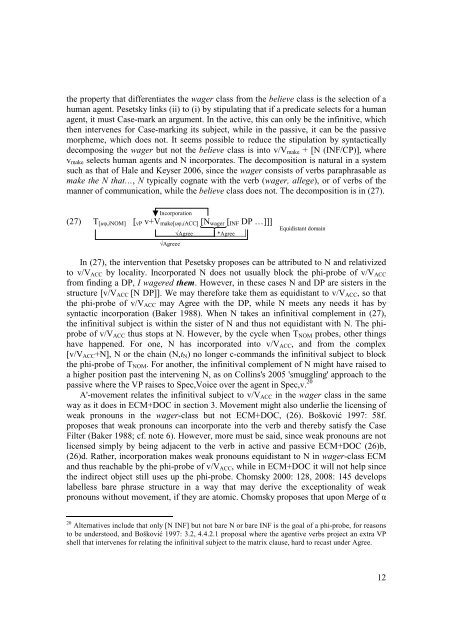Case Filter - UMR 7023 - CNRS
Case Filter - UMR 7023 - CNRS
Case Filter - UMR 7023 - CNRS
Create successful ePaper yourself
Turn your PDF publications into a flip-book with our unique Google optimized e-Paper software.
the property that differentiates the wager class from the believe class is the selection of a<br />
human agent. Pesetsky links (ii) to (i) by stipulating that if a predicate selects for a human<br />
agent, it must <strong>Case</strong>-mark an argument. In the active, this can only be the infinitive, which<br />
then intervenes for <strong>Case</strong>-marking its subject, while in the passive, it can be the passive<br />
morpheme, which does not. It seems possible to reduce the stipulation by syntactically<br />
decomposing the wager but not the believe class is into v/V make + [N (INF/CP)], where<br />
v make selects human agents and N incorporates. The decomposition is natural in a system<br />
such as that of Hale and Keyser 2006, since the wager consists of verbs paraphrasable as<br />
make the N that…, N typically cognate with the verb (wager, allege), or of verbs of the<br />
manner of communication, while the believe class does not. The decomposition is in (27).<br />
Incorporation<br />
(27) T [uφ,iNOM] [ vP v+V make[uφ,iACC] [N wager [ INF DP …]]]<br />
√Agreee<br />
√Agree<br />
*Agree<br />
Equidistant domain<br />
In (27), the intervention that Pesetsky proposes can be attributed to N and relativized<br />
to v/V ACC by locality. Incorporated N does not usually block the phi-probe of v/V ACC<br />
from finding a DP, I wagered them. However, in these cases N and DP are sisters in the<br />
structure [v/V ACC [N DP]]. We may therefore take them as equidistant to v/V ACC , so that<br />
the phi-probe of v/V ACC may Agree with the DP, while N meets any needs it has by<br />
syntactic incorporation (Baker 1988). When N takes an infinitival complement in (27),<br />
the infinitival subject is within the sister of N and thus not equidistant with N. The phiprobe<br />
of v/V ACC thus stops at N. However, by the cycle when T NOM probes, other things<br />
have happened. For one, N has incorporated into v/V ACC , and from the complex<br />
[v/V ACC +N], N or the chain (N,t N ) no longer c-commands the infinitival subject to block<br />
the phi-probe of T NOM . For another, the infinitival complement of N might have raised to<br />
a higher position past the intervening N, as on Collins's 2005 'smuggling' approach to the<br />
passive where the VP raises to Spec,Voice over the agent in Spec,v. 20<br />
A'-movement relates the infinitival subject to v/V ACC in the wager class in the same<br />
way as it does in ECM+DOC in section 3. Movement might also underlie the licensing of<br />
weak pronouns in the wager-class but not ECM+DOC, (26). Bošković 1997: 58f.<br />
proposes that weak pronouns can incorporate into the verb and thereby satisfy the <strong>Case</strong><br />
<strong>Filter</strong> (Baker 1988; cf. note 6). However, more must be said, since weak pronouns are not<br />
licensed simply by being adjacent to the verb in active and passive ECM+DOC (26)b,<br />
(26)d. Rather, incorporation makes weak pronouns equidistant to N in wager-class ECM<br />
and thus reachable by the phi-probe of v/V ACC , while in ECM+DOC it will not help since<br />
the indirect object still uses up the phi-probe. Chomsky 2000: 128, 2008: 145 develops<br />
labelless bare phrase structure in a way that may derive the exceptionality of weak<br />
pronouns without movement, if they are atomic. Chomsky proposes that upon Merge of α<br />
20 Alternatives include that only [N INF] but not bare N or bare INF is the goal of a phi-probe, for reasons<br />
to be understood, and Bošković 1997: 3.2, 4.4.2.1 proposal where the agentive verbs project an extra VP<br />
shell that intervenes for relating the infinitival subject to the matrix clause, hard to recast under Agree.<br />
12

















